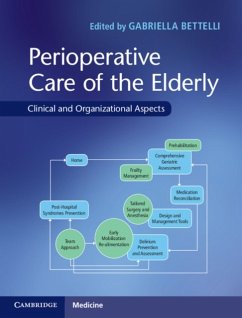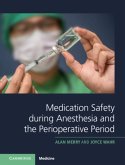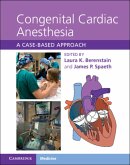Perioperative Care of the Elderly
Clinical and Organizational Aspects
Herausgeber: Bettelli, Gabriella
Perioperative Care of the Elderly
Clinical and Organizational Aspects
Herausgeber: Bettelli, Gabriella
- Gebundenes Buch
- Merkliste
- Auf die Merkliste
- Bewerten Bewerten
- Teilen
- Produkt teilen
- Produkterinnerung
- Produkterinnerung
This updated, innovative and comprehensive book uniquely integrates the educational needs of anaesthetists, surgeons, geriatricians, medical directors and nurses dealing with geriatric surgery. It allows them to speak the same language, share the same goals, incorporate each other's knowledge and develop both technical and non-technical skills.
Andere Kunden interessierten sich auch für
![Perioperative Temperature Management Perioperative Temperature Management]() Anselm BrauerPerioperative Temperature Management79,99 €
Anselm BrauerPerioperative Temperature Management79,99 €![Medication Safety During Anesthesia and the Perioperative Period Medication Safety During Anesthesia and the Perioperative Period]() Alan Merry (University of Auckland)Medication Safety During Anesthesia and the Perioperative Period69,99 €
Alan Merry (University of Auckland)Medication Safety During Anesthesia and the Perioperative Period69,99 €![Postoperative Nausea and Vomiting Postoperative Nausea and Vomiting]() Postoperative Nausea and Vomiting74,99 €
Postoperative Nausea and Vomiting74,99 €![Congenital Cardiac Anesthesia Congenital Cardiac Anesthesia]() Congenital Cardiac Anesthesia105,99 €
Congenital Cardiac Anesthesia105,99 €![Perioperative Drill-Based Crisis Management Perioperative Drill-Based Crisis Management]() Perioperative Drill-Based Crisis Management59,99 €
Perioperative Drill-Based Crisis Management59,99 €![The Perioperative Medicine Handbook The Perioperative Medicine Handbook]() The Perioperative Medicine Handbook96,99 €
The Perioperative Medicine Handbook96,99 €![Anaesthesia for the Elderly Patient Anaesthesia for the Elderly Patient]() Chris Dodds (Consultant Anaesthetist, Consultant Anaesthetist, DepaAnaesthesia for the Elderly Patient54,99 €
Chris Dodds (Consultant Anaesthetist, Consultant Anaesthetist, DepaAnaesthesia for the Elderly Patient54,99 €-
-
This updated, innovative and comprehensive book uniquely integrates the educational needs of anaesthetists, surgeons, geriatricians, medical directors and nurses dealing with geriatric surgery. It allows them to speak the same language, share the same goals, incorporate each other's knowledge and develop both technical and non-technical skills.
Hinweis: Dieser Artikel kann nur an eine deutsche Lieferadresse ausgeliefert werden.
Hinweis: Dieser Artikel kann nur an eine deutsche Lieferadresse ausgeliefert werden.
Produktdetails
- Produktdetails
- Verlag: Cambridge University Press
- Seitenzahl: 376
- Erscheinungstermin: 15. Dezember 2017
- Englisch
- Abmessung: 261mm x 197mm x 22mm
- Gewicht: 982g
- ISBN-13: 9781107139343
- ISBN-10: 1107139341
- Artikelnr.: 49404466
- Herstellerkennzeichnung
- Libri GmbH
- Europaallee 1
- 36244 Bad Hersfeld
- gpsr@libri.de
- Verlag: Cambridge University Press
- Seitenzahl: 376
- Erscheinungstermin: 15. Dezember 2017
- Englisch
- Abmessung: 261mm x 197mm x 22mm
- Gewicht: 982g
- ISBN-13: 9781107139343
- ISBN-10: 1107139341
- Artikelnr.: 49404466
- Herstellerkennzeichnung
- Libri GmbH
- Europaallee 1
- 36244 Bad Hersfeld
- gpsr@libri.de
Foreword
Preface
Introduction: population aging, healthcare systems and surgery
Part I. Preoperative Evaluation: 1. Aging and age-related functional changes
2. Preoperative evalution: a 360° perspective
3. Comorbidities and multimorbidity
4. Poly-medication and perioperative drugs management
5. Assessment of functional reserves
6. Cognitive and emotional evaluation
7. Sensorial evaluation and impact of hearing and visual impairment on communication
8. Preoperative testing
9. Team-based discussion on preoperative evaluation and decision-making about surgery
10. Communication and informed consent
11. Preoperative care in emergency surgery
Part II. Preparation to Surgery: 12. Prehabilitation: how to enhance cardio-respiratory functional reserves before surgery
13. Diagnosis and treatment of nutritional deficits
14. Prevention of cognitive complications
15. Psychological support in elderly surgical patients
16. The role of geriatric nurses in preparing the elderly for surgery
Part III. Intraoperative Management: 17. Entering the operating theatre: a challenging experience
18. Safety in the operating room: special needs of geriatric patients
19. The geriatric patient and anesthesia
20. Regional anesthesia techniques
21. Fluids and electrolytes management
22. Surgery in the elderly: general considerations
23. Cancer surgery and the elderly
24. Orthopedic surgery
25. Cardiovascular surgery
26. Thoracic surgery
27. Abdominal surgery
28. Day surgery
29. Cataract surgery and other office-based procedures
Part IV: Postoperative Management: 30. The elderly in the recovery room
31. Endocrine and metabolic response to surgical stress in the elderly
32. Postoperative pain treatment
33. General principles of postoperative recovery
34. Fast-track and ERAS programs in geriatric surgery
35. Postoperative nursing
36. Cardiovascular complications
37. Perioperative venous thromboembolism in the elderly: prevention and treatment
38. Treatment of postoperative delirium
39. Postoperative respiratory complications
40. Renal complications
41. Postoperative admission to the intensive care unit
42. Prevention of postoperative geriatric syndromes
43. Planning for discharge
44. Ethics in geriatric surgery, end of life and palliative care
Part V. Key Issues for Optimal Organization: 45. Models of care and organizational solutions for geriatric surgery
46. Hospital design
47. Patient's safety, ergonomics and clinical risk management
48. Systemic approach to management in GS: methods and tools
49. Systems engineering in GS: the contribute of modelling and simulation
50. Closing the loop with the client's perspective: how the elderly live the experience of surgery
Index.
Preface
Introduction: population aging, healthcare systems and surgery
Part I. Preoperative Evaluation: 1. Aging and age-related functional changes
2. Preoperative evalution: a 360° perspective
3. Comorbidities and multimorbidity
4. Poly-medication and perioperative drugs management
5. Assessment of functional reserves
6. Cognitive and emotional evaluation
7. Sensorial evaluation and impact of hearing and visual impairment on communication
8. Preoperative testing
9. Team-based discussion on preoperative evaluation and decision-making about surgery
10. Communication and informed consent
11. Preoperative care in emergency surgery
Part II. Preparation to Surgery: 12. Prehabilitation: how to enhance cardio-respiratory functional reserves before surgery
13. Diagnosis and treatment of nutritional deficits
14. Prevention of cognitive complications
15. Psychological support in elderly surgical patients
16. The role of geriatric nurses in preparing the elderly for surgery
Part III. Intraoperative Management: 17. Entering the operating theatre: a challenging experience
18. Safety in the operating room: special needs of geriatric patients
19. The geriatric patient and anesthesia
20. Regional anesthesia techniques
21. Fluids and electrolytes management
22. Surgery in the elderly: general considerations
23. Cancer surgery and the elderly
24. Orthopedic surgery
25. Cardiovascular surgery
26. Thoracic surgery
27. Abdominal surgery
28. Day surgery
29. Cataract surgery and other office-based procedures
Part IV: Postoperative Management: 30. The elderly in the recovery room
31. Endocrine and metabolic response to surgical stress in the elderly
32. Postoperative pain treatment
33. General principles of postoperative recovery
34. Fast-track and ERAS programs in geriatric surgery
35. Postoperative nursing
36. Cardiovascular complications
37. Perioperative venous thromboembolism in the elderly: prevention and treatment
38. Treatment of postoperative delirium
39. Postoperative respiratory complications
40. Renal complications
41. Postoperative admission to the intensive care unit
42. Prevention of postoperative geriatric syndromes
43. Planning for discharge
44. Ethics in geriatric surgery, end of life and palliative care
Part V. Key Issues for Optimal Organization: 45. Models of care and organizational solutions for geriatric surgery
46. Hospital design
47. Patient's safety, ergonomics and clinical risk management
48. Systemic approach to management in GS: methods and tools
49. Systems engineering in GS: the contribute of modelling and simulation
50. Closing the loop with the client's perspective: how the elderly live the experience of surgery
Index.
Foreword
Preface
Introduction: population aging, healthcare systems and surgery
Part I. Preoperative Evaluation: 1. Aging and age-related functional changes
2. Preoperative evalution: a 360° perspective
3. Comorbidities and multimorbidity
4. Poly-medication and perioperative drugs management
5. Assessment of functional reserves
6. Cognitive and emotional evaluation
7. Sensorial evaluation and impact of hearing and visual impairment on communication
8. Preoperative testing
9. Team-based discussion on preoperative evaluation and decision-making about surgery
10. Communication and informed consent
11. Preoperative care in emergency surgery
Part II. Preparation to Surgery: 12. Prehabilitation: how to enhance cardio-respiratory functional reserves before surgery
13. Diagnosis and treatment of nutritional deficits
14. Prevention of cognitive complications
15. Psychological support in elderly surgical patients
16. The role of geriatric nurses in preparing the elderly for surgery
Part III. Intraoperative Management: 17. Entering the operating theatre: a challenging experience
18. Safety in the operating room: special needs of geriatric patients
19. The geriatric patient and anesthesia
20. Regional anesthesia techniques
21. Fluids and electrolytes management
22. Surgery in the elderly: general considerations
23. Cancer surgery and the elderly
24. Orthopedic surgery
25. Cardiovascular surgery
26. Thoracic surgery
27. Abdominal surgery
28. Day surgery
29. Cataract surgery and other office-based procedures
Part IV: Postoperative Management: 30. The elderly in the recovery room
31. Endocrine and metabolic response to surgical stress in the elderly
32. Postoperative pain treatment
33. General principles of postoperative recovery
34. Fast-track and ERAS programs in geriatric surgery
35. Postoperative nursing
36. Cardiovascular complications
37. Perioperative venous thromboembolism in the elderly: prevention and treatment
38. Treatment of postoperative delirium
39. Postoperative respiratory complications
40. Renal complications
41. Postoperative admission to the intensive care unit
42. Prevention of postoperative geriatric syndromes
43. Planning for discharge
44. Ethics in geriatric surgery, end of life and palliative care
Part V. Key Issues for Optimal Organization: 45. Models of care and organizational solutions for geriatric surgery
46. Hospital design
47. Patient's safety, ergonomics and clinical risk management
48. Systemic approach to management in GS: methods and tools
49. Systems engineering in GS: the contribute of modelling and simulation
50. Closing the loop with the client's perspective: how the elderly live the experience of surgery
Index.
Preface
Introduction: population aging, healthcare systems and surgery
Part I. Preoperative Evaluation: 1. Aging and age-related functional changes
2. Preoperative evalution: a 360° perspective
3. Comorbidities and multimorbidity
4. Poly-medication and perioperative drugs management
5. Assessment of functional reserves
6. Cognitive and emotional evaluation
7. Sensorial evaluation and impact of hearing and visual impairment on communication
8. Preoperative testing
9. Team-based discussion on preoperative evaluation and decision-making about surgery
10. Communication and informed consent
11. Preoperative care in emergency surgery
Part II. Preparation to Surgery: 12. Prehabilitation: how to enhance cardio-respiratory functional reserves before surgery
13. Diagnosis and treatment of nutritional deficits
14. Prevention of cognitive complications
15. Psychological support in elderly surgical patients
16. The role of geriatric nurses in preparing the elderly for surgery
Part III. Intraoperative Management: 17. Entering the operating theatre: a challenging experience
18. Safety in the operating room: special needs of geriatric patients
19. The geriatric patient and anesthesia
20. Regional anesthesia techniques
21. Fluids and electrolytes management
22. Surgery in the elderly: general considerations
23. Cancer surgery and the elderly
24. Orthopedic surgery
25. Cardiovascular surgery
26. Thoracic surgery
27. Abdominal surgery
28. Day surgery
29. Cataract surgery and other office-based procedures
Part IV: Postoperative Management: 30. The elderly in the recovery room
31. Endocrine and metabolic response to surgical stress in the elderly
32. Postoperative pain treatment
33. General principles of postoperative recovery
34. Fast-track and ERAS programs in geriatric surgery
35. Postoperative nursing
36. Cardiovascular complications
37. Perioperative venous thromboembolism in the elderly: prevention and treatment
38. Treatment of postoperative delirium
39. Postoperative respiratory complications
40. Renal complications
41. Postoperative admission to the intensive care unit
42. Prevention of postoperative geriatric syndromes
43. Planning for discharge
44. Ethics in geriatric surgery, end of life and palliative care
Part V. Key Issues for Optimal Organization: 45. Models of care and organizational solutions for geriatric surgery
46. Hospital design
47. Patient's safety, ergonomics and clinical risk management
48. Systemic approach to management in GS: methods and tools
49. Systems engineering in GS: the contribute of modelling and simulation
50. Closing the loop with the client's perspective: how the elderly live the experience of surgery
Index.








